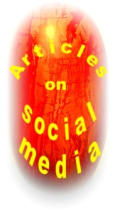
.





‘Knowledge is power’



World’s
encyclopedic
knowledge
compacted
in
your
hand





Please raise the vol to listen to the
lady airing awe @ the SINGLE author encyclopedia
You may also like:
Future humans to look like Pokemon characters sound
Saudi writer urges groping of women to make them stay at home
?DNA Proof of 6" Tall Extraterrestrial: 2013
Sixth sense technology that'll empower humanity -TED lecture
As far as we could tell, no one had been hurt. The shooter was long gone, and we
had seen the back of him for only a second or two. On the other hand, calling the
police posed considerable risks. It carried the very real possibility of inviting
disrespect, even physical harm. We had seen witnesses treated like suspects,
and knew how quickly black people calling the police for help could wind up
cuffed in the back of a squad car. Some of us knew of black professionals who’d
had guns drawn on them for no reason.
This was before Michael Brown. Before police killed John Crawford III for carrying
a BB gun in a Wal-Mart or shot down 12-year-old Tamir Rice in a Cleveland park.
Before Akai Gurley was killed by an officer while walking in a dark staircase and
before Eric Garner was choked to death upon suspicion of selling “loosies.”
Without yet knowing those names, we all could go down a list of unarmed black
people killed by law enforcement.
We feared what could happen if police came rushing into a group of people who,
by virtue of our skin color, might be mistaken for suspects.
For those of you reading this who may not be black, or perhaps Latino, this is my
chance to tell you that a substantial portion of your fellow citizens in the United
States of America have little expectation of being treated fairly by the law or
receiving justice. It’s possible this will come as a surprise to you. But to a very real
extent, you have grown up in a different country than I have.
As Khalil Gibran Muhammad, author of The Condemnation of Blackness, puts it,
“White people, by and large, do not know what it is like to be occupied by a police
force. They don’t understand it because it is not the type of policing they
experience. Because they are treated like individuals, they believe that if ‘I am not
breaking the law, I will never be abused.’”
We are not criminals because we are black. Nor are we somehow the only people
in America who don’t want to live in safe neighborhoods. Yet many of us cannot
fundamentally trust the people who are charged with keeping us and our
communities safe.
As protest and revolt swept across the Missouri suburb of Ferguson and
demonstrators staged die-ins and blocked highways and boulevards from
Oakland to New York with chants of “Black lives matter,” many white Americans
seemed shocked by the gaping divide between law enforcement and the black
communities they are supposed to serve. It was no surprise to us. For black
Americans, policing is “the most enduring aspect of the struggle for civil rights,”
says Muhammad, a historian and director of the Schomburg Center for Research
in Black Culture in New York. “It has always been the mechanism for racial
surveillance and control.”
In the South, police once did the dirty work of enforcing the racial caste system.
The Ku Klux Klan and law enforcement were often indistinguishable. Black-and-
white photographs of the era memorialize the way Southern police sicced
German shepherds on civil rights protesters and peeled the skin off black children
with the force of water hoses. Lawmen were also involved or implicated in untold
numbers of beatings, killings and disappearances of black Southerners who
forgot their place.
In the North, police worked to protect white spaces by containing and controlling
the rising black population that had been propelled into the industrial belt during
the Great Migration.
Empowering Book Newsletter






WOMEN’S POWER: ITS PAST, ITS PRESENT, ITS FUTURE: FEMOCRACY
WEB PAGES
OUR OFFERING
UPLOADED ITEMS
OUR EMAIL
kri200@womenspowerbook.org
QUESTION




















